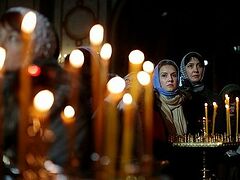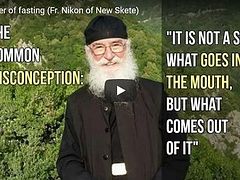Wise words by the holy fathers on fasting, posted at the end of the Apostle’s fast, but good to know all year long.
To many of us, a midpoint of a long fasting period comes through trials. The enthusiasm of the first days of fasting has waned off and we feel somewhat tired because of all the dietary limitations. It also gets increasingly difficult to resist the worldly commotion reaching its apogee in the days leading up to Christmas and the New Year. Some might even feel dejected, mourning the frailty of their mind and body. That’s when we need the support, a wise spiritual lesson, or an admonition. Here we are offering a selection of sayings by the holy fathers and ascetics about the meaning and importance of fasting, paying particular attention to their teachings about fasting rules for children as the most relevant in today’s world. We can surely rely on folk wisdom about the ascetic endeavor such as fasting and the sayings presented below are a case in point.
 Is this not the fast that I have chosen: to loose the bonds of wickedness, to undo the heavy burdens, to let the oppressed go free, and that you break every yoke? Is it not to share your bread with the hungry, and that you bring to your house the poor who are cast out (Isaiah 58:6-7).
Is this not the fast that I have chosen: to loose the bonds of wickedness, to undo the heavy burdens, to let the oppressed go free, and that you break every yoke? Is it not to share your bread with the hungry, and that you bring to your house the poor who are cast out (Isaiah 58:6-7).
Is this not the fast that I have chosen: to loose the bonds of wickedness, to undo the heavy burdens, to let the oppressed go free, and that you break every yoke? Is it not to share your bread with the hungry, and that you bring to your house the poor who are cast out (Isaiah 58:6-7).
“Moreover, when you fast, do not be like the hypocrites, with a sad countenance. For they disfigure their faces that they may appear to men to be fasting. Assuredly, I say to you, they have their reward. But you, when you fast, anoint your head and wash your face, so that you do not appear to men to be fasting, but to your Father who is in the secret place; and your Father who sees in secret will reward you openly (Matthew 6:16-18).
As you begin fasting, loosen every bond of wickedness, untie the tightened cords of forcible contracts, Break thy bread to the hungry, and bring the shelterless into thy house; if thou seest one naked clothe him; Then shall thy light break forth in the morning, and thy healing shall arise quickly, and righteousness shall go before thy face, and the glory of God shall environ thee.
Apostle Barnabas
“First of all, keep thyself from every evil word and every evil device, and purify thy heart from all the vanities of this world. If thou keep these things, thy fast shall be perfect for thee.”
The Shepherd of Hermas
 Holy Hierarch John Chrysostom: “As bodily food fattens the body so fasting strengthens the soul”
Holy Hierarch John Chrysostom: “As bodily food fattens the body so fasting strengthens the soul”
“As bodily food fattens the body so fasting gives strength into the soul, imparting it an easy flight, it enables it to ascend on high, to contemplate lofty things, and to put the heavenly higher than the pleasant and pleasurable things of life.”
St. John Chrysostom
“A light skiff easily cruises the waves, while an overloaded vessel perishes by its weight. Thus the fast that alleviates the spirit makes it more agile to cross the sea of this world. Our eyes are turned to heaven and the things of heaven, and our thoughts despise the goods of the earth which appear to us only a shadow and a dream.”
St. John Chrysostom
“Fasting is a teacher of moderation, mother of virtue, tutor of the children of God, a conductress of the disorderly, tranquility of the mind, a foothold of life, steady and imperturbable peace; its strictness and importance subdue passions, extinguishes wrath and anger, dampens and mutes all kinds of disturbances caused by overeating.”
Holy Hierarch Asterius of Amasea
“The more days of fasting there are, the better the healing is; the longer the period of abstinence, the more abundant is the gain of salvation.”
Blessed Augustine
“Just as we fast with our stomachs, we should fast also from every other sin; just as we fast with the belly, we should fast also with the tongue, restraining it from slander, lies, idle-talking, belittlement, anger, and in a word, from every sin that is performed by the tongue. We must likewise fast with the eyes, that is, avoid looking at vain things, we must not give freedom to our eyes or look at anyone shamelessly and without fear. The hands and feet should also be constrained from every evil deed.”
Abba Dorotheos of Gaza
 St. Symeon the New Theologian: “Fasting is the beginning and foundation of all ascetic labor”
St. Symeon the New Theologian: “Fasting is the beginning and foundation of all ascetic labor”
“Fasting is the beginning and foundation of all ascetic labor. Whatever you build on this foundation cannot collapse or be destroyed, because they are built on solid rock. But if you remove this foundation of fasting and substitute with the satisfying of the stomach or other improper desires, an edifice of virtues will be shattered and dispersed like sand carried away by torrents of evil thoughts and passions.”
St. Symeon the New Theologian
“Fasting as the healer of our souls is effective: in the case of some, it quiets the impulses of the flesh, and it calms anger in others; it drives sleep away in some and encourages zeal for doing good deeds; it restores purity of mind and liberates from wicked thoughts. In some, it will rein in an unbridled tongue and harness it through the fear of God preventing them from uttering idle or sordid words. In others, it will invisibly guard their eyes, not letting them wander hither and thither and preparing to look with due attention at themselves.”
St. Symeon the New Theologian
“There are two types of fasts, the carnal fast and a sincere fast. The fast in the body means abstaining from food and drink; when you fast sincerely, the soul stays ways from evil thoughts, deeds, and words. Anyone who withdraws from any evil is fasting well. So, if you desire, O Christian, that the fast is useful to you, fast carnally, fast sincerely, and fast always.”
Holy Hierarch Tiknon of Zadonsk
“Make fasting the foundation of your spiritual effort. The essential quality of every foundation should be an unshakable firmness; otherwise, it will be impossible to construct a building on it, however solid the building itself may be. So let us never on any account, on any pretext whatsoever, allow ourselves to break the fast by overeating, and especially by drunkenness.”
St. Ignatius Brianchaninov
 St. Barsanuphius of Optina: “A fast that ignites a prayer life is particularly detested by the enemy of mankind”
St. Barsanuphius of Optina: “A fast that ignites a prayer life is particularly detested by the enemy of mankind”
“A fast that ignites a prayer life is particularly detested by the enemy of mankind: to anyone who comes for confession or advice, I say: among other things, please keep to the holy fasts. They do agree with everything else but when it comes to fasting, all I hear is, I don’t want to, I can’t, and so forth… That’s how the enemy abhors fasting: it agitates us against fasting, he doesn’t want us to keep the holy fasts.”
St. Barsanuphius of Optina
“A Christian must fast to clear the mind, to rouse and develop his feelings, and to stimulate his will to do good deeds. We extinguish and subdue these three capabilities of ours, above anything else, by gluttony, drunkenness, and cares of this life. Because of them, we fall away from God, the Source of life, and cast ourselves to a life of corruption and vanity perverting and defiling the image of God within us.”
St. John of Kronstadt
“Fasting clearly shows or discloses all the infirmities of our soul in all its weaknesses, deficiencies, sins, and passions; it is akin to a cloudy dead water that, when filtered, reveals what kinds of creeping things and waste it contains.”
St. John of Kronstadt
“If a man only theorizes about God, he is utterly helpless to confront the evil spirits since all they do is sneer at our feeble worldly philosophizing. But as soon as a man commits to fasting and praying to God, the evil spirits are filled with inexpressible fear. Anyone who comes to God with sincere prayer, patience, and hope while exercising fasting and abstinence will restrain and suffocate the evil spirits so much that they choose to leave him alone.”
St. Nikolai Velimirovich
 St. Nikolai Velimirovich: “An ever-satiated man has an ever-famished soul”
St. Nikolai Velimirovich: “An ever-satiated man has an ever-famished soul”
“An ever-satiated man has an ever-famished soul. Whoever holds a fast prepares a feast for his soul. The more intense is man’s fasting, the less he is concerned about the demands of his flesh, the more his soul rejoices. It isn’t enough to simply talk or learn about it. Once a man makes an effort to act and live accordingly, a question of fasting is settled on its own.”
St. Nikolai Velimirovich
“Fasting is the abstinence from anything harmful that corrupts the soul or, namely, from passions, the basis of all sin… To overcome all the passions without exception, we must learn to restrain ourselves. We can’t afford it without bodily fasting. Just as the schoolchildren advance in knowledge beginning with basics and progressing to a higher level, from alphabet to calculus, so should abstinence begin with the ABCs of fasting that harnesses the carnal desires of one’s belly.”
St. Luke (Voino-Yasenetsky)
“Just as anyone holding a top job in the civil service should be on alert for any harmful disturbances in the area of his authority, our fast is keeping guard over our soul. Fasting is like careful inspection against anything that could harm our soul. Fasting is an examination of our thoughts, a vigil for our eyesight against harmful scenes and the wasteful conversations that hurt our hearing, against empty language, bad for our tongue, and improper food, wasteful for our mouths.”
St. John of Shanghai
 St. Paisios of the Holy Mountain: “Even the angels are seen in a fleshly way by unchaste youths, much like the citizen of Sodom who abandoned God”
St. Paisios of the Holy Mountain: “Even the angels are seen in a fleshly way by unchaste youths, much like the citizen of Sodom who abandoned God”
“For healthy young adults, abstinence is the best restraint to keep passions in check, necessary for the spirit and peace to prevail. Then, in chastity of their hearts, they can also view people just as the angels look at other bodily powers. Those who don’t abstain and live without any restraints even look at the angels in a fleshly way, much like the citizen of Sodom who abandoned God. Carnal love is the inevitable outcome for them who love their carnal, well-fed flesh and the comforts of life; their flesh is what brings them down spiritually.”
St. Paisios the Athonite
“During the Nativity Fast, let us prepare ourselves with the strict discipline of the mind by carefully examining the inner dealings of our hearts: how we treat others, ourselves, and God. Are we attuned to the teachings of the Church about prayer, worship, and obedience to God’s commandments?
Let us be more attentive than we typically are about keeping the physical rules of fasting. These rules are made to help us shake off our natural affinity to slackness and indulgence and inspire us to stay alert, remain vigilant, and avoid sinking further into worldliness that keeps us from soaring up high to God. Keep those rules; diligently prepare yourself throughout the Navitity Fast, awaiting the arrival of the Messiah not half-heartedly but in that state of a focused vigil of a sentry guard awaiting the arrival of his Queen or a King. Let us remember about the greatest honor of being in the presence of God for it is the holiest of all things that can ever happen to us.”
Met. Anthony of Sourozh
“Fasting is the mother of good health, a mentor of adolescents, and an adornment of elders; it is a good-hearted companion to travelers and a trustful partner in marriage… Fasting is the most respectable adornment of women, restraint in the prime of life, a keeper of matrimony, a mentor of maidenhood. Fasting banishes indecent talk, songs, and mockery. Had fasting ruled the universe, we would have enjoyed eternal peace; our life wouldn’t be so sorrowful and utterly pitiful because, with fasting, people could have learned to abstain from excesses in food, and this knowledge could have guided them towards the obliteration of all sins.”
Archimandrite Kirill (Pavlov)
Fasting and children
 St. Luke (Voino-Yasenetsky): “Do not denigrate fasting, and teach the children to fast beginning from the earliest age”
St. Luke (Voino-Yasenetsky): “Do not denigrate fasting, and teach the children to fast beginning from the earliest age”
“A child’s nourishment should be enough for him to develop and grow up strong and healthy in such a way that it doesn’t light the fire of flesh-pleasing in his soul. We shouldn’t be overly concerned if the child is too young but we ought to instruct the child from his early years on how to temper the flesh, which inclines toward unrefined matter, and train him to be its master, so that in both childhood and teenage years, just as later in life, he can easily and freely control this carnal demand of the flesh. The first leaven is precious. Much depends in the ensuing time on childhood feeding. One can easily develop two kinds of gluttony—pleasure-seeking and excess in foods, the inclinations cultivated in feeding, both equally pernicious for the body and soul.”
St. Theophan the Recluse
“Do not denigrate fasting, and teach the children to fast beginning from the earliest age… Many people do not understand this, and they neither keep fasts themselves nor teach their children to fast. Not only don’t they teach them, but they also give a harmful example of avoiding fasting… During a fast, a mother gives meat to her children saying, “Eat, my dearest, eat! It’s okay that it is a fasting time now. God knows that we always struggle to get food on the table. God will forgive us and He won’t call us to account…” But no! God will call you to account if you continue to corrupt your children! Every mother should instruct her children to fast from an early age as it was in the old times, when everyone observed the fasts. Do not forget about fasting, but instead, do as a small child who clings to his mother’s side, holding fast to all canons of the Church.”
St. Luke (Voino-Yasenetsky)
“People today follow the worldly logic that says, ‘Children shouldn’t fast or they will get sick; they should have everything well provided for—we must protect them from hardships.’ That’s how they live, poor things, always asking for patty cakes even though it is worthless food. Anytime a man rejoices that he abstains from foods for the sake of Christ’s love, he is truly nurtured. If he, for the sake of Christ’s love, prefers the unsavory to the delicious, then through the unsavory he delights in Christ.”
St. Paisios the Athonite
Sayings and proverbs about fasting
 A wise folk saying: “Whoever fasts four times a year is prayed for by all four Evangelists”
A wise folk saying: “Whoever fasts four times a year is prayed for by all four Evangelists”
-
Fasting and prayer come to our rescue.
-
Fasting takes us to the Gates of Paradise, while almsgiving opens them.
-
Miss the bridge and you hit the river, miss a fast and you find an untimely end.
-
The soul would love to enjoy fasting but the belly revolts against it.
-
Every day is not Sunday: Great Lent’s turn has come.
-
Great Lent will chicken you out.
-
We fast through and through yet it’s worth nothing.
-
No one dies from fasting, yet gluttony kills.
-
Whoever fasts four times a year is prayed for by all four Evangelists.
-
. Fasting is good for its fuss-free food.



